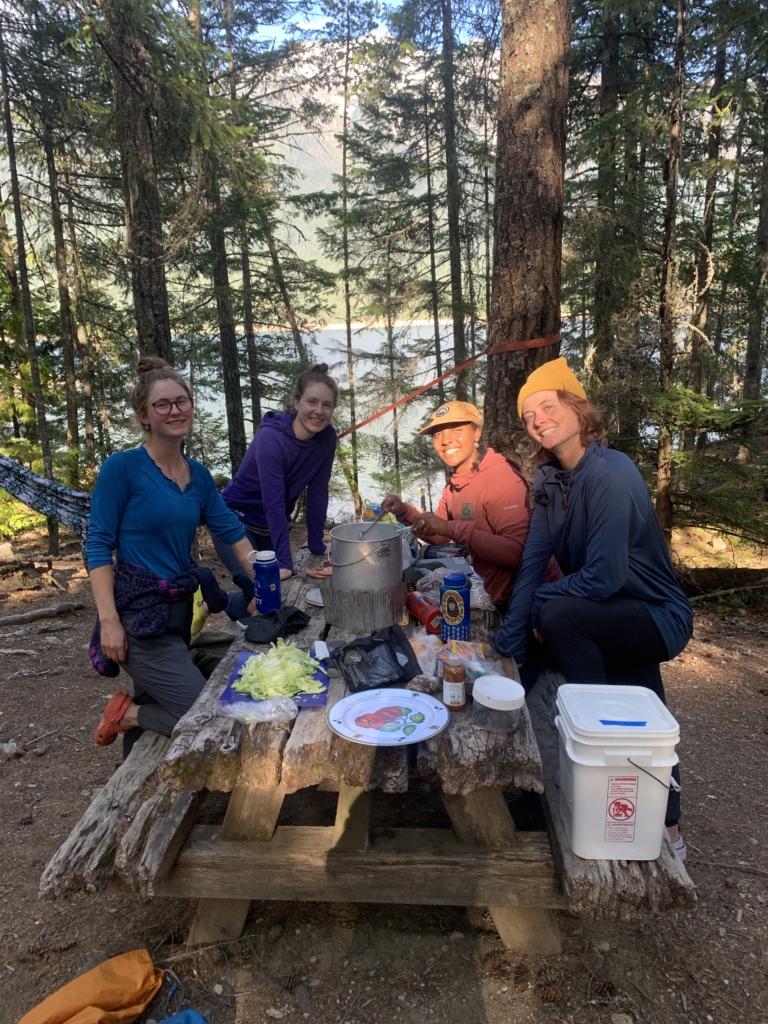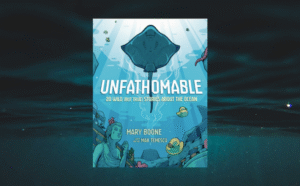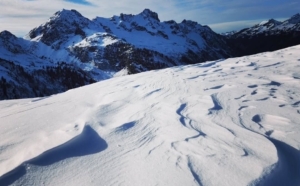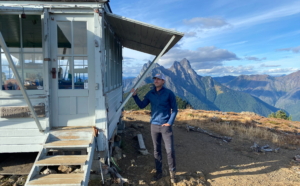
YLA Life: Trust, Solving Problems, and Living inside a Garmin!
Youth Leadership Adventures are immersive summer trips for motivated high schoolers ready for challenge and connection in the North Cascades. These 5- and 8-day field courses bring 8th–12th grade students into the natural world while exploring climate change, building community, and growing their leadership skills. Participants canoe-camp, backpack, and complete hands-on stewardship projects in North Cascades National Park and the Mt. Baker-Snoqualmie National Forest — building confidence, resilience, and a lasting connection to place. Information and applications for Summer 2026 at ncascades.org/youth!
By Kate Little, Youth Leadership Coordinator
When I’m downvalley and strangers ask me about my job and Youth Leadership Adventures, I’ve always had a response ready to go: “I organize canoeing and backpacking trips for local high school students in the North Cascades.” But lately, I’ve been thinking about how far that description feels from my day-to-day work and all the wonderful and hard problems that crop up when working with high-school students in remote places. For example, it leaves out the wonderful parts of YLA that live in the off season. In winter, like so many migratory animals, the full-time YLA team (Eva, Neal, and I) head downvalley for a season full of meetings with teachers, community members, and students. The work of building connections with other organizations, educators, and students is more difficult to photograph than a teenager in a canoe on Ross Lake, but it’s just as essential to getting kids into the backcountry.
For example, it leaves out the wonderful parts of YLA that live in the off season. In winter, like so many migratory animals, the full-time YLA team (Eva, Neal, and I) head downvalley for a season full of meetings with teachers, community members, and students. The work of building connections with other organizations, educators, and students is more difficult to photograph than a teenager in a canoe on Ross Lake, but it’s just as essential to getting kids into the backcountry.
In every new year, the YLA work grows again as we start heading into schools to recruit students and spreading the word to find backcountry instructors. The instructors need to have strong backcountry skills, good decision-making under stress, Spanish language skills, and the ability to teach a varied curriculum. You can’t Google what you should do while you’re in the backcountry, you’re relying on your experience and communication with your team. Every bit of communication between me and the instructors on a trip gets channeled through the format of 250-character messages on a Garmin, sent back and forth in a process that takes time and where errors can have big consequences.

In summer, the bulk of my role is supervising this team of instructors. In 2024, my first year as the Youth Leadership Coordinator, I felt like I had a lot to learn. My years at the ELC had given me experience supervising staff, problem-solving weather emergencies, power outages, illness, and injury. I had detailed knowledge of the logistics of every other program that NCI runs, but lacked a window into the experience of instructors disappearing into the backcountry for a week at a time. But over the course of the summer, I would learn how much I could lean on the rest of the team. Everyone was bringing their own varied interests and experiences to the table.
After hiring the incredible instructor teams that we had last summer, Neal, Eva, and I sat down to discuss our specific goals for training and broader goals for the summer. Beyond the obvious objective of nine successful trips with students, we wanted instructors to feel supported, be able to trust us and each other, and be challenged to grow.
During staff training, we practiced communicating succinctly and clearly during a canoe capsize scenario. On one side of the beach, Eva and I wrote “Garmin” messages on slips of paper to respond to the instructors, who were doing a patient assessment of a couple of wet and shivering “students.” Meanwhile, canoes rolled on breaking waves against rocks, the wind howled, and gear floated downwind on Ross Lake. The manufactured chaos was a helpful reminder of what could happen on a trip and how to quickly and calmly manage stressful situations as a team. It also underscored how important trust is when instructors take students into the backcountry. We rely on their good judgement in the field and with students, and they rely on us in sharing information, weather conditions, and advice.
The YLA instructors from summer 2024 took to calling Neal, Eva, and I the “tiny Garmin people,” like we had shrunk down to live in the handheld device and were with them the entire time. This limited channel of communication is one of the most challenging aspects of working YLA. It’s not always possible to communicate all of the nuances of a situation in 250 characters. I instead tried to accept that I wouldn’t always have direct experience with a situation, but could trust the instructors to ask me for what they needed.
Over time, I got better at anticipating problems that they might face, and I look forward to the end of every trip, when they return and tell me everything else about their trip, the friendships formed, wildlife seen, and the group dynamic formed.
Every summer brings different challenges. As a team, we’ve faced trials like wildfire smoke, illness, injury, strong winds, and language barriers. At the end of summer 2024, instructors shared that it was hard to keep bringing the same excitement and energy to teaching their fourth and fifth trips of the season, but it didn’t feel fair to slow down with students who had looked forward to this trip all summer long.
We workshopped strategies to prepare for the rest of the season and energize the instructors. We looked for big and small ways to embrace novelty on the trail and keep things balanced, from re-assigning who was teaching each lesson, sillier shake-ups like loaning out my heart-eye sunglasses for extra pizzazz, and finding individual solutions that worked for each instructor.
At the end of that ninth trip, a few instructors asked me to write a reflection on their season. I compiled each of the sets of notes that I had from our check-ins, trip debriefs, and goal-setting conversations and shared a summary with them. It was wonderful to close the season by reminding instructors of what they’d accomplished in such a short time. It also helped me reflect on the ways I’d grown as a supervisor, and the places where I need to learn more and improve. We left the warm weather behind with the knowledge that instructors had done what they set out to do. They ran nine successful and safe trips, built a strong relationship with their co-instructors, and guided many students to a deeper relationship with nature.
In the fall, as students return to school and instructors move on to new roles, I also enter another season. For me, the fall is all about taking all of that gathered feedback from instructors into account, building skills that can help me support the next team, and finding the places we can strengthen the program.
I’ll also be getting some rest over the winter so I can get ready for next year, when I’ll shrink back down and live in a Garmin all over again!
 Kate grew up on the Kitsap Peninsula before heading east to earn degrees in Environmental Studies and English at Oberlin College in Ohio. After graduation, Kate accepted a two-year Shansi Fellowship and moved to Madurai, India. There she worked with college students in an International Studies center, worked on her conversational Tamil and hiked in the Nilgiris. One pandemic evacuation and several seasonal jobs later, Kate made the move back to Washington in 2021 and enjoyed getting to know the Skagit Valley in all its seasons as Learning Center Manager. In 2023, Kate transitioned to a role in one of her favorite Institute programs: Youth Leadership Adventures! In her free time you can usually find her biking around upriver, knitting up a sweater or swimming in the Skagit.
Kate grew up on the Kitsap Peninsula before heading east to earn degrees in Environmental Studies and English at Oberlin College in Ohio. After graduation, Kate accepted a two-year Shansi Fellowship and moved to Madurai, India. There she worked with college students in an International Studies center, worked on her conversational Tamil and hiked in the Nilgiris. One pandemic evacuation and several seasonal jobs later, Kate made the move back to Washington in 2021 and enjoyed getting to know the Skagit Valley in all its seasons as Learning Center Manager. In 2023, Kate transitioned to a role in one of her favorite Institute programs: Youth Leadership Adventures! In her free time you can usually find her biking around upriver, knitting up a sweater or swimming in the Skagit.










